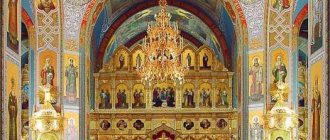Archpriest Vladimir Puchkov answers.
Sometimes we are asked about simple and even obvious things. I was recently asked: “Who is an apostle?” At first I was surprised: it seems like the word is far from rare and quite well-known. Especially in the Church. But, on the other hand, our time is the time of people who don’t read, and therefore even the most banal questions are now asked not as a joke, but out of ignorance, even if this is ignorance of the obvious. In fact, how can you not get confused here: Christ’s disciple is an apostle, and the liturgical book is also an apostle, and who knows what it all means?..
Well, let's take it in order.
In Dahl's dictionary
m. Greek student, follower, adherent; | teacher of orthodoxy; | the name of the twelve disciples of Christ sent by Him to preach the Gospel; | book of deeds and their messages. The Apostle's Epistle, speaking of a famous apostle; apostolic epistles, everything. The Apostolic Church, containing entirely their teaching. The beard is apostolic, and the mustache is devilish, about schismatics and hypocrites. Apostleship cf. their rank, status, duties. Apostle of the m. shawl with which monks cover their chest and neck; cockle
Disciples and closest companions of Christ
So, the direct answer to the question who is an apostle is a disciple of Christ. From the Gospel we know that at the beginning of His earthly ministry the Savior called twelve people who became His disciples and throughout His ministry accompanied Him, sharing with Him the hardships of nomadic life, shelter and food. By origin, the students were commoners. It is known that some of them (Peter, Nathanael, Thomas, James, John, Andrew) were fishermen. One, Matthew, was a tax collector before being called. At least one of the students, Simon, is known to have been a member of the Zealots before his conversion, an extremist political movement that sought to overthrow Roman rule at any cost. Practically, the apostles came from Galilee, a deeply provincial (in the modern sense of the word “province”) area of Palestine. The only exception could be Judas Iscariot, who may have been a native of Judea or even a resident of the outskirts of Jerusalem.
It is noteworthy that the incarnate God chose His disciples far from being from the elite of the society of that time. People who lived on hard daily labor, representatives of a despised profession and a marginal political movement. Provincials, who were distinguished in society even by their manner of speech (with a characteristic whistle when pronouncing hissing sounds)... One might say that Christ surrounded Himself with those who were not noticed in the crowd and were not heard in the company. If they paid attention to anyone, it was only condescendingly and ironically. However, it was they who became witnesses to the death and resurrection of the Lord, it was they who carried this testimony throughout the world, it was through their gospel that the Church of Christ grew from a small Jerusalem community into a multimillion-dollar Christian community, having started a struggle with which even the powerful Roman Empire was forced to surrender.
We know the twelve apostles by name:
- Simon , called Peter ;
- Andrew , brother of Simon;
- John , who subsequently wrote the Gospel, Revelation and three epistles;
- James Zebedee , brother of John;
- Thomas , nicknamed the Twin;
- Matthew , a former tax collector, who later also became an evangelist;
- Philip of Bethsaida of Galilee;
- Nathanael , aka Bartholomew (literally "son of Tolomei");
- Simon the Zealot;
- Judah Jacob , aka Thaddeus;
- Jacob Alphaeus , brother of Judah;
- Judas Iscariot , who ultimately turned out to be a traitor;
- Matthias , chosen to replace Judas after the Ascension of Christ and Pentecost.
Christian meaning of the concept "Gospel"
In church understanding it means the following:
- The good news is that the Lord lifted the curse of the very first sin from humanity and told us how you can save your spiritual component.
- A generalized name for the Savior’s teaching, which he gave to his disciples. The word “Gospel” describes the disciples’ account of the activities of Jesus of Nazareth and his moral teachings. At the center of their story is the idea that Jesus is the head of the Kingdom of Heaven, the messiah and the redeemer of human sins.
- In certain cases, this designation describes New Testament wisdom in the form of the Christian religion, telling about significant events in the life of the Son of God, as well as the morality that he preached and disseminated. Also, the word “Gospel” is used to interpret certain events that happened to Christ and the people around him.
- The story is about the sacrifice that Jesus made in the name of all mankind, for the sake of its salvation and the further continuation of life in the Kingdom of God.
- The word “Gospel,” as well as its synonym “Good News,” describes the spread of Christian ideals. Consequently, “Evangelization” is a full-scale missionary activity, the essence of which is the preaching of biblical teaching.
The original meaning of the concept "Gospel"
In addition to the question “what is an apostle?”, an equally common question is about the meaning of the term “Gospel”. Like the previous word, it is of Greek origin and literally means positive and good news. In ancient Greece, the word "Gospel" was used in the following cases:
- To describe a gift to a messenger who brought good news.
- To describe a sacrifice made to ancient deities in honor of receiving positive news.
- To describe positive news.
Changes
Time passed, the persecution of Christians continued, but at a certain moment the government leadership of Rome decided to stop fighting the adherents of the new religious movement. After some time, Christianity received official approval from the authorities, and soon became the official religion of Rome. After these events, everyone knew the meaning of the word “apostle”, as well as the philosophy that these people propagated.
Apostolic ministry
Being the foundation of the Church of Christ, the apostles form a council that heads the church and realizes its fullness; they appoint other ministers of the church and send messengers to whom they delegate their authority; for example, they send Barnabas to found a church in Syrian Antioch (Acts 11:22), and during his mission he ordains elders, teaches and generally enjoys the same rights as the apostles (Acts 14:1-23). Thus, the apostles not only have the authority given to them by Christ, but can also transfer it to their chosen successors. This is the basis of the idea of apostolic succession - the transfer of power that Christ gave to the apostles to all bishops leading local churches; this transfer is carried out continuously through ordination from one bishop to another from apostolic times right up to the present day (St. Clement of Rome already speaks about the importance of apostolic succession at the end of the century).
Other apostles
However, church tradition calls not only the disciples of Christ apostles. In a broad sense, an apostle is a traveling preacher. Be that as it may, even Christ’s closest disciples devoted the bulk of their lives to preaching. Therefore, an apostle is at the same time a disciple of Christ and, at the same time, a preacher. So, by beginning to preach the Gospel in the world, the Lord's disciples laid the foundation for a tradition that existed in the Church for some time after their death. Representatives of this tradition were traveling preachers. This phenomenon was even reflected in church writing. Thus, in the oldest Christian literary monument “Didache” (the full title is “the teaching of the Lord through the twelve apostles to the pagans”), a criterion is given for distinguishing a true apostle from a false one (you must agree, the very fact that swindlers could pose as traveling preachers indicates the widespread occurrence of such kind of preaching): Christian communities were invited to host a preacher and provide him with shelter and food for three days. The true apostle did not stay longer in one place. And if the preacher still showed a desire to stay longer, then this served as a sign that before Christians he was not an apostle, but a parasite and a scoundrel trying to make a living at someone else’s expense.
So, let's summarize. The full answer to the question, who is an apostle, is this: an apostle is a disciple of the Lord, he is also a preacher of the Gospel from among Christ’s disciples and, in general, a wandering Christian preacher during the period of the 1st–2nd centuries, who may have never seen the Savior and did not know His disciples, but preaching Christ. Now, having figured out who the apostles are, let’s talk about the book that was mentioned at the beginning. In liturgical use there is indeed a book called “The Apostle.” This book contains a number of books of the New Testament, namely:
- Acts of the Holy Apostles;
- Conciliar Epistle of the Apostle James;
- 2 cathedral epistles of the Apostle Peter;
- 3 cathedral epistles of the Apostle John;
- Cathedral Epistle of the Apostle Jude.
- 14 epistles of the Apostle Paul: to the Romans;
- 2 Corinthians;
- to the Galatians;
- to the Ephesians;
- to the Philippians;
- to the Colossians;
- 2 Thessalonians;
- 2 to Timothy;
- to Titus;
- to Philemon;
- to the Jews.
All these books are printed in it with appropriate symbols for daily reading during worship. The apostolic readings at the Liturgy are read from it. Hence, in fact, the name.
How do we know about the “second” Judas?
First of all, from the Gospel. True, this apostle is called Judas only in two gospel stories - from Luke and from John. In the first he is referred to as Judas Jacob (Luke 6:16 ), in the second he is referred to as “Judas is not Iscariot” (as opposed to the traitor; John 14:22 ). The evangelists Mark and Matthew do not report anything about the “second” Judas, but they mention among the twelve apostles Thaddeus (Mark 3:18 ) or “Lebway, called Thaddeus” (Matthew 10 :3), about whom, on the contrary, Luke and John. Since the rest of the lists of the apostles in the Synoptic Synoptic (from the Greek συνὄψις - joint description) are called the Gospels of Matthew, Mark and Luke, in the narratives of which there is especially much in common, distinguishing them from the Gospel of John written later. The Gospels coincide, then already in the early Church the assumption was born that these three names - Judas Jacob, Levway and Thaddeus - were borne by the same disciple. For example, the ancient Christian teacher Origen (ⱡ about 254) was convinced of this; The most authoritative theologian and interpreter of the Gospel of the early Church, Saint Athanasius the Great, also believed (ⱡ 373).
In Judea two thousand years ago, it was not uncommon for a person to have several names: let us recall, for example, the Apostle Peter (in the original Hebrew this Greek name sounds like Cephas), whose original name was Simon. And the names Thaddeus and Levvey are also close in meaning. The name Thaddeus comes from the Aramaic תדי (“tadai”), and Levway from the Hebrew lēb; both mean “heart.” It is possible that these were the nicknames of the apostle - “brave, courageous, courageous.”
Used materials
- Zhivov, V.M., Holiness.
Brief dictionary of hagiographic terms : - “General Troparions”, calendar page of the portal Pravoslavie.Ru
:
[1] The number 70 is also symbolic: according to legend, the proto-language was divided into 70 (or 72) languages as punishment for the Babylonian Pandemonium, therefore this number symbolizes preaching to all the peoples of the earth (for the same reasons, in the 3rd century BC. 70 (or 72) interpreters were chosen to translate the sacred books into Greek)
The Beginning of Christianity
You already know what “apostle” means. Now the time has come to talk about where exactly the disciples of Jesus Christ spread his teachings and what difficulties they encountered.
The government of the Roman Empire initially had a negative attitude towards the teachings spread by the followers of the true God. People who converted to Christianity were persecuted and severely punished for a long time for their worldview. The first Christians had to hide in the catacombs and, secretly from the authorities, spread the good news about the Savior. That is why fish was chosen as a symbol of the first followers of Christ - a sign of silence and silence.
Despite all the persecution and persecution, the young religion continued to spread throughout the territory of the powerful Roman state, attracting new followers. More and more people began to learn about Christ, the afterlife, the holy letter and what an apostle is.








